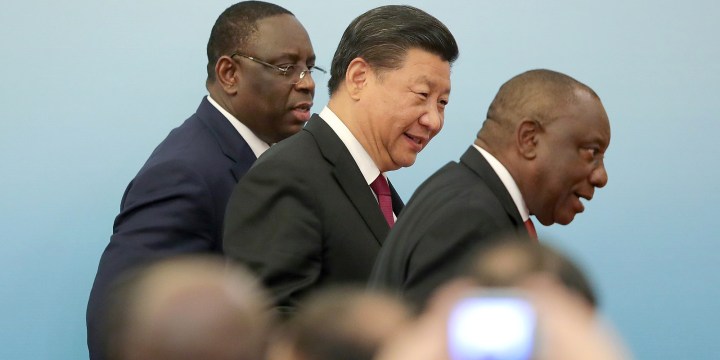BEIJING LOANS OP-ED
China’s investment in Africa: Walking the fine line between debt-trap diplomacy and promotion of development

While it is generally believed that Chinese financing is harmful to Africa, the truth is that all deals with African countries are negotiated and approved by African political leaders. Thus, African governments are complicit in accepting these bad deals.
Is China using debt-trap diplomacy against African countries? This question has been recurrently asked by Africans each time any African country tries to seek a loan from China. This question has also been raised by Western sources, due to their concerns about China’s foothold on Africa’s economic and political landscape.
The term “debt-trap diplomacy” is commonly used to describe suspected use of lending by bilateral lenders to gain access to the assets of developing nations. These assets may be infrastructure, facilities, finances or even political influence, which are exploited over a country. According to Brahma Chellaney, who coined the term, Beijing uses this tactic to acquire strategic assets of countries that default on their repayments, such as Zambia.
Indeed, China facilitates access to finance, but its approach has resulted in massive debt in several African countries. China allegedly threatened to seize Zambia’s national assets if it failed to meet its loan repayment obligations. Reports indicate that as of 2019, the Zambian government owed the Chinese $23-billion in loans, project money and infrastructure.
There were rumours that China would take control of Mombasa port in exchange for Kenyan debt repayment defaults. In Uganda, a similar scenario is playing out. In 2015, the East African nation borrowed $200-million from the Export-Import Bank of China to upgrade Entebbe International Airport. According to unconfirmed reports, Uganda is on the verge of losing its international airport due to a Chinese loan default.
For African countries, China is an important development partner and its focus on infrastructural projects could boost connectivity across the continent.
In light of this trend, what is the basis of this conversation about the Chinese debt trap? Does this imply that African governments have no control over the terms of their deals with external actors, including China? Will this fear of a debt trap compel African countries to stop accepting Chinese development loans?
While it is generally believed that Chinese financing is harmful to Africa, the truth is that all deals with African countries are negotiated and approved by African political leaders. Thus, African governments are complicit in accepting these bad deals.
In 2013, during the presidency of Jakaya Kikwete, China and Tanzania struck a $10-billion infrastructure agreement for the construction of Bagamoyo Port. China allegedly demanded a 33-year guarantee and a 99-year lease under this agreement. Furthermore, the Tanzanian government, reportedly, would have no say in appointing investors for the project and China would be rewarded with land for the port’s drilling and construction.
However, when the late president John Magufuli assumed office in 2015, he terminated the agreement. The deal’s conditions, according to Magufuli, were disadvantageous to Tanzania because they amounted to relinquishing Tanzania’s sovereignty to China. Current Tanzanian President Samia Hassan has begun talks with the Chinese on this project.
Similarly, last year, Democratic Republic of the Congo (DRC) announced the possibility of renegotiating the deals signed with China during Joseph Kabila’s presidency. The most notable contract was the Sicomines Agreement which has failed to provide any positive outcomes for the country.
Under this agreement, not only were cobalt and copper mining rights granted to Chinese partners, it also ensured a tax exemption until the infrastructure and mining debts were fully paid. This put the DRC in a vulnerable position as it would not get any meaningful revenue from the deal. DRC President Felix Tshisekedi has acknowledged that the agreement was poorly negotiated and contrary to the interests of the DRC. Tshisekedi noted that the deal was not negotiated in a manner that would protect the DRC’s interests.
There is no legal obligation on the external party to strive to protect a partner in a bilateral transaction. Discovering that the terms harm their interests, African governments should be able to use the review terms in the agreement for renegotiation. However, African governments must insist on inserting such terms in the agreement. Tshisekedi’s government is attempting to renegotiate a more favourable contract that prioritises DRC interests, but it is unclear whether he will succeed.
The cases of Tanzania and the DRC show that African political leaders are negotiating disastrous deals for their countries, which account for the debt traps.
That said, this issue should not stop African countries from seeking Chinese assistance. Rather, they should negotiate smartly by seeking to protect the interests of their countries when making trade deals, seeking loans or entering financial transactions with major powers such as China.
African governments should build well-trained negotiation teams to improve their bargaining capabilities. Due to their lack of negotiation skills, they should consider engaging other experts for assistance to negotiate better deals with China.
In addition, African governments need to be conscious of the costs associated with the projects they pursue and the trade-offs into which they enter. Chinese-sponsored infrastructure projects come at a steep cost, which could easily lead to debt distress as experienced by several African countries.
On the other hand, these are projects that could build long-term capacity for sustained economic recovery and transformation. Therefore, African countries must critically evaluate the investment assistance they require from China to meet their development objectives. African countries can then use this opportunity to develop strategies to attract Chinese investment on terms favourable to them. DM
Hellen Adogo is a research assistant at the University of Johannesburg’s Institute for Pan-Africa Thought and Conversation.
[hearken id=”daily-maverick/9072″]

















 Become an Insider
Become an Insider
African leaders take the kick backs in the moment and don’t really give a shit about the actual African country and China knows this.